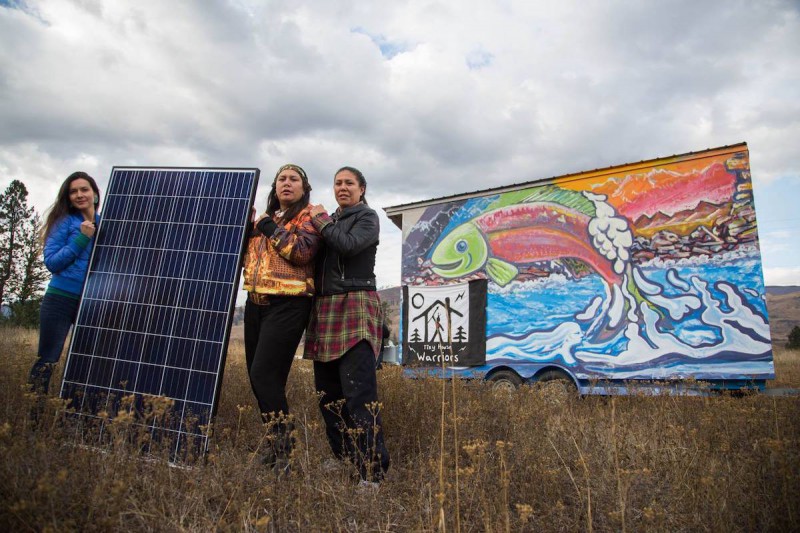Groups argued a previous judicial review of project’s approval was unfairly denied

Workers are pictured at the Trans Mountain pipeline construction site in Burnaby, B.C. last June. The Supreme Court of Canada has declined to hear five B.C.-based challenges against the approval of the pipeline expansion project. (Ben Nelms/CBC)
The Supreme Court of Canada has declined to hear five B.C.-based challenges against the approval of the Trans Mountain pipeline expansion project.
Groups determined to overturn the project — two First Nations, environmental organizations and teenage activists — had argued a previous judicial review of the pipeline’s re-approval by the federal government was unfairly denied by a single judge from the Federal Court of Appeal in September.
The Squamish and Tsleil-Waututh First Nations, the Raincoast Conservation Foundation, B.C. Nature and several youth climate activists applied to the country’s highest court for leave to appeal the dismissal last fall.
The Supreme Court declined to grant the leave in a decision posted Thursday. As is custom, the court did not provide reasons for its decision.
For one of the groups, the ruling marks the end of its six-year legal fight against the pipeline.
5 groups were originally among 12
Twelve groups originally filed challenges against the project with the Federal Court of Appeal last year.
On Sept. 4, the court only agreed to take up six of those appeals. It chose just to hear challenges based on the issue of whether the federal government consulted Indigenous peoples adequately before approving the project for a second time in June.
The federal court declined to hear the second part of the overall dispute: arguments centred on environmental concerns and claims of government bias. Several of the applicants argued the National Energy Board didn’t do enough to address environmental and marine concerns when it green-lit the project, while the two First Nations said the federal cabinet couldn’t objectively approve or deny the project because they own it.
The four teenaged activists had said Ottawa did not fully consider the pipeline’s potential impact on climate change before approving the project.

The Squamish Nation and the Tsleil-Wautuh Nation were among the groups who succeeded at the federal court in September, but pressed ahead to the Supreme Court of Canada because they thought concerns around bias and the environment should be heard.
“Obviously, this pipeline has become a political issue as much as a legal or economic issue,” said lawyer Eugene Kung, who was not named in the application to the Supreme Court but has previously worked to stop the expansion project.
“What the applicants are looking for is just that the laws of Canada be applied when this project is approved. They’ve said that it hasn’t, and that has very real consequences.”

The Raincoast Conservation Foundation, one of the groups which lost its bid Thursday, has long been fighting the pipeline on the basis that the project would further threaten B.C.’s southern resident killer whales.
The foundation cannot pursue its legal challenge further, as there’s no court higher than the Supreme Court of Canada.
“This scenario should serve as a wake-up call,” Margot Venton said in a statement Thursday. “If the government is allowed to shirk its responsibilities [to at-risk species], then there is something fundamentally wrong with how Canadian species protection works in practice.”
Rebecca Wolf Gage, 13, said she and the other activists were “devastated” they will not have their day in court.
“I feel like I have failed the generations of the future by not being able to stop this pipeline,” Wolf Gage said in a statement.
The sixth group whose challenges were dismissed in federal court in September did not join the other five in pursuing leave to appeal with the Supreme Court.
The proposed Trans Mountain pipeline expansion would carry nearly a million barrels of refined oil products and crude oils from Alberta to the B.C. coast every day. The Crown corporation that now owns the line has previously said the expansion will be finished by mid-2022.
A statement from Alberta Energy Minister Sonya Savage said Thursday’s decision “clears the way” for the project to be finished, though she said recent blockades at pipeline and rail sites elsewhere in Canada “continue to be a concern” for the national economy. SOURCE







/https://www.thestar.com/content/dam/thestar/politics/federal/2019/09/04/federal-court-to-rule-on-letting-trans-mountain-pipeline-challenges-proceed/cpt13110046.jpg)

